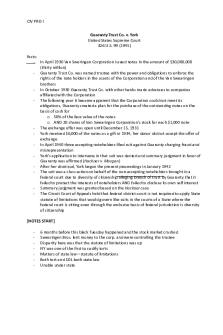Brief-Drennan. v. Star Paving Co - Contracts PDF

| Title | Brief-Drennan. v. Star Paving Co - Contracts |
|---|---|
| Author | Nick Walter |
| Course | Contracts |
| Institution | Arizona State University |
| Pages | 2 |
| File Size | 45.7 KB |
| File Type | |
| Total Downloads | 39 |
| Total Views | 161 |
Summary
Case brief....
Description
Drennan v. Star Packing Co., 333 P.2d 757 (1958). Facts:
Parties: Drennan, plaintiff-appellant; Star Paving Co., defendant-appellee. Drennan, a contractor, sued Star Paving Co., a sub-contractor, for refusing to perform paving work according to a bid it had submitted to the plaintiff. Plaintiff won; defendant appealed. The defendant had submitted a bid for about $7,000 to the plaintiff to perform paving work. The plaintiff used the defendant’s bid in its general bid for a job and won the job. The next day, the plaintiff stopped by the defendant’s office and introduced himself; the defendant immediately said that he could no longer do the work because they had made a mistake in their original bid. The defendant refused to do the work for less than $15,000, more than twice their original bid. The plaintiff was forced to find another sub-contractor to do the work for $11,000 and then sued the defendant.
Issue:
The issue is whether the plaintiff’s reliance on the defendant’s offer made the offer irrevocable.
Rationale:
The defendant claimed that “there was no enforceable contract” because it had made a revocable offer and revoked the offer before the plaintiff accepted. The plaintiff claimed that because he relied to his detriment on defendant’s bid, then an enforceable contract existed. The court discussed the Restatements Second of Contracts § 45, which says that if performance is begun in a unilateral contract, which was what happened here, then the offer becomes irrevocable. The court further discussed that comment b of § 45 says that an offer will include (often implied, not directly stated) a “subsidiary promise” that if performance is begun, then the offer is irrevocable. The court said that the consideration for this subsidiary promise may be partial performance or tender of performance of the contract. The court also said that this subsidiary promise serves to prevent the injustice of offerors backing out of unilateral contracts where an offeree had relied on an offeror’s bid or promise. The court stated that the defendant knew that the plaintiff would have reliance on its bid and even wanted and welcomed this reliance.
Therefore, the court held that the reliance that the plaintiff had was sufficient to bind the defendant to his bid, and therefore, there was a contract.
Disposition: The court reversed the decision of the lower court and remanded the case with judgment for the plaintiff.
Holding:
The court held that because the plaintiff had acted in reliance on the defendant’s bid, there was an enforceable contract and the plaintiff is entitled to damages for breach.
Rules:
When there has been reliance on a bid made by a sub-contractor, the court may use promissory estoppel to find that an enforceable contract exists. “Merely acting in justifiable reliance on an offer may in some cases serve as sufficient reason for making a promise binding.”...
Similar Free PDFs

Drennan v. Star Paving Co.
- 2 Pages

Nanakuli Paving and Rock Co
- 2 Pages

Morsi v. Fermar Paving Ltd
- 3 Pages

Guaranty Trust Co. v. York
- 4 Pages

Pennsylvania Coal Co. v. Mahon
- 2 Pages

Midler v Ford Motor Co
- 4 Pages

Richmond v. J.A. Croson Co
- 2 Pages

More star examples - STAR
- 4 Pages

Hecht v. Andover Assoc. Mgmt. Co
- 3 Pages
Popular Institutions
- Tinajero National High School - Annex
- Politeknik Caltex Riau
- Yokohama City University
- SGT University
- University of Al-Qadisiyah
- Divine Word College of Vigan
- Techniek College Rotterdam
- Universidade de Santiago
- Universiti Teknologi MARA Cawangan Johor Kampus Pasir Gudang
- Poltekkes Kemenkes Yogyakarta
- Baguio City National High School
- Colegio san marcos
- preparatoria uno
- Centro de Bachillerato Tecnológico Industrial y de Servicios No. 107
- Dalian Maritime University
- Quang Trung Secondary School
- Colegio Tecnológico en Informática
- Corporación Regional de Educación Superior
- Grupo CEDVA
- Dar Al Uloom University
- Centro de Estudios Preuniversitarios de la Universidad Nacional de Ingeniería
- 上智大学
- Aakash International School, Nuna Majara
- San Felipe Neri Catholic School
- Kang Chiao International School - New Taipei City
- Misamis Occidental National High School
- Institución Educativa Escuela Normal Juan Ladrilleros
- Kolehiyo ng Pantukan
- Batanes State College
- Instituto Continental
- Sekolah Menengah Kejuruan Kesehatan Kaltara (Tarakan)
- Colegio de La Inmaculada Concepcion - Cebu






